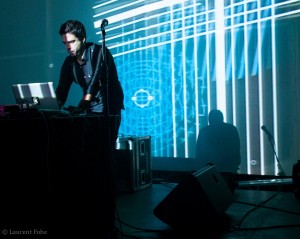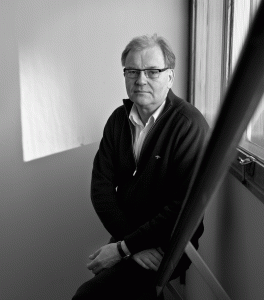
Photo Laurent Fobe
Academic dissertation to be presented for public examination with the permission of the Research Board of the Aalto University School of Art, Design and Architecture, in Sampo auditorium (Media Centre Lume), Hämeentie 135 C, on March 1, 2013, at 12 noon.
Professor Nick Bryan-Kinns from Queen Mary, University of London will act as the opponent.
Professor Lily Díaz will act as the Custos.
This dissertation studies four projects combining visuals, sound and interactivity by the author and André Carrilho (under the name Video Jack). The aim of the study is to create web-based interactive audiovisual art projects for integrated and simultaneous manipulation of sound and motion graphics, in a way that is coherent, flexible, easy to use, playful, and engaging to experience. From this study aim, three major research topics emerge: content, interactivity and experience.
The four projects included in the study are: Heat Seeker (2006), AVOL (2007), Master and Margarita (2009) and AV Clash (2010) [1]. The three last projects have adopted an Interactive AudioVisual Objects (IAVO) approach, introduced in this study, consisting of the integration of sound, audio visualization and Graphical User Interface (GUI). Following this approach, GUI elements are embedded in the visuals, and aesthetically integrated with the animation style and with the overall visual character of each project. These projects have been developed with a cross-platform perspective (performance, net art, non-interactive video, soundtrack and exhibition), and the study focuses on the net art versions.
The methodology for the dissertation is practice-based research, complemented by a user study. The background and motivation for the work are presented, and the projects are contextualized with related works. The study is framed within the field of audiovisual art, and connections are established between the projects and related concepts. The combination of audio, visuals and interaction is discussed.
The conclusions are grouped around six topics: content, interactivity, experience (the main research topics), project management, methodology, and future developments. Strengths and weaknesses detected in the projects are analyzed, taking into account the results of the user study. These are followed by more generic conclusions that aim to provide useful contributions to the field of interactive audiovisual art
[1] The projects can be accessed from: htttp://www.videojackstudios.com
Nuno N. Correia (Porto, 1972) is a researcher, teacher and audiovisual artist (also as Video Jack and Coden), currently based in Helsinki. He has been teaching media art and design since 2000 in universities in Portugal, Finland and Estonia. The focus of his work is to create engaging multi-sensorial experiences and to enable audiovisual creativity. He has presented his projects in more than 20 countries, in such festivals and venues as ACM Multimedia – Interactive Art (Scottsdale), Electro-Mechanica (St. Petersburg), FILE (São Paulo), ISEA (Istanbul), Le Cube (Paris), Mapping (Geneva), NAME (Lille), Optronica / British Film Institute (London), PixelAche / Kiasma (Helsinki) and SXSW (Austin). Website: www.nunocorreia.com


